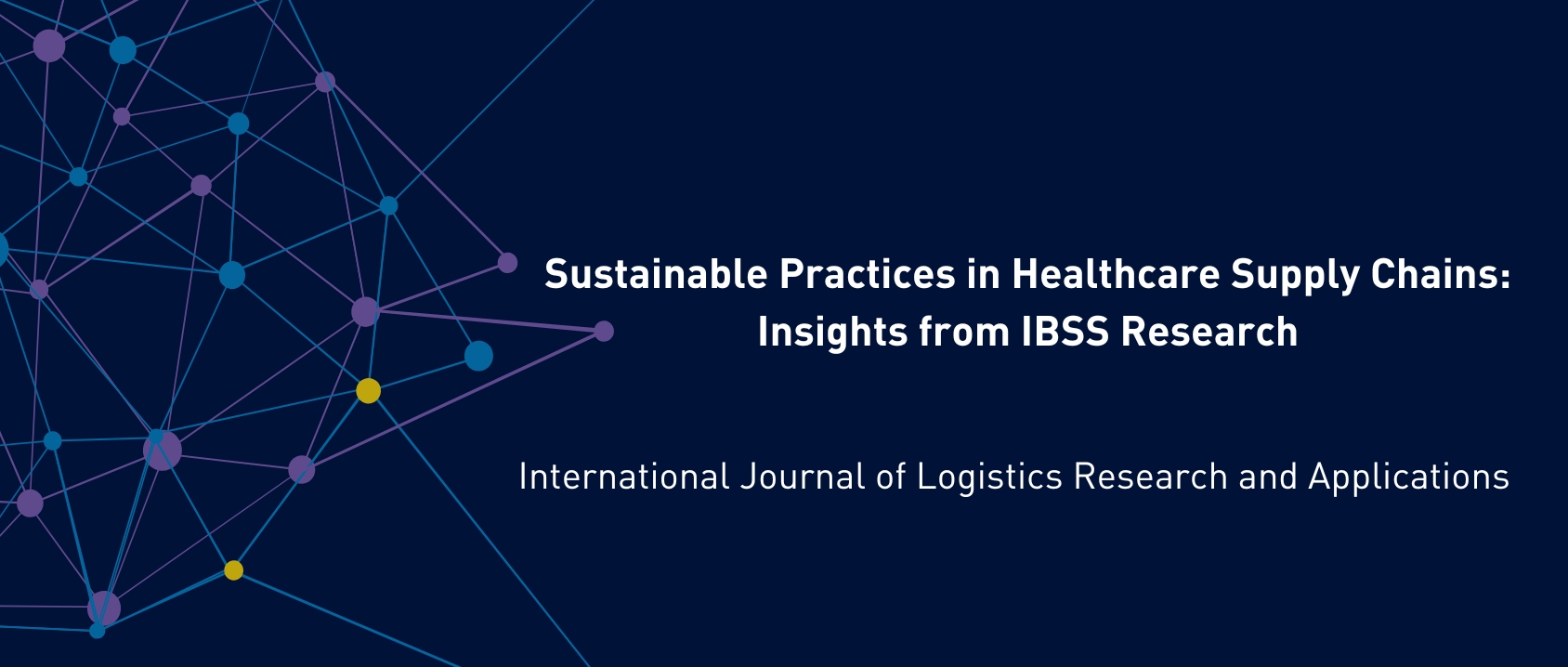06 May 2025
Recently, a paper titled " Sustainable Practices in Healthcare Supply Chains: A Review of Strategies, Challenges, and Impacts?" co-authored by Professor Lujie Chen from the International Business School Suzhou (IBSS) at Xi’an Jiaotong-Liverpool University (XJTLU) and her collaborators has been accepted and published in the International Journal of Logistics Research and Applications, a JCR Q1, Tier 1* journal.

Sustainability in healthcare supply chains has become a critical priority in response to growing environmental challenges and increasing regulatory demands. This study identifies drivers, practices, barriers, and outcomes of sustainability in healthcare supply chains and offers actionable insights for practitioners and industry leaders.
The study highlights four key drivers of sustainability: coercive, mimetic, normative, and technological pressures. Each plays a critical role in shaping organizational sustainability practices. Coercive pressure requires organizations to proactively respond to external pressures, such as regulatory requirements, by aligning their supply chain practices with sustainability goals. Mimetic pressure influences organizations to adopt practices seen as successful in their industry to maintain competitiveness. Normative pressure stems from societal expectations and ethical considerations. Technological pressure encourages investment in technology, such as IoT and AI, to enhance compliance and improve operational efficiency.
The study categorizes practices into three domains: procurement, internal operations, and reverse logistics. In sustainable procurement, initiatives like blockchain technology for transparency and traceability in pharmaceutical supply chains are gaining traction. Companies should adopt advanced digital tools to streamline procurement processes, ensuring quality control and reduced waste. For internal operations, practices such as energy-efficient technologies and lean operations reduce energy consumption and waste generation. Facility managers should prioritize energy optimization systems and train staff to implement these innovations effectively. In reverse logistics, effective waste segregation and closed-loop systems for medical devices can minimize environmental impact. Companies should build partnerships with specialized waste management firms to enhance reverse logistics capabilities.
The study identifies three main barriers to implementation: technological, organizational, and environmental. Technological barriers include infrastructure limitations and complex data ecosystems. Healthcare organizations should adopt incremental technological solutions and invest in scalable infrastructure improvements. Organizational barriers involve professional silos and resistance to change, which hinder progress. Leadership must foster cross-functional collaboration and align sustainability goals with core healthcare objectives to overcome internal resistance. Environmental barriers include regulatory complexities and cost pressures, which limit adoption, particularly in resource-constrained settings. Streamlined regulations and cost-sharing models, possibly through public-private partnerships, can mitigate these challenges.
The research underscores the interconnected nature of social, economic, and environmental outcomes, with significant short-term challenges leading to long-term benefits. Social outcomes include improved working conditions and enhanced reputation, though implementation often introduces stress among employees. Effective change management strategies are essential to balance employee well-being with sustainability goals. Economic outcomes show that while initial investments can be high, long-term cost savings from waste reduction and energy efficiency are substantial. Organizations should focus on the total cost of ownership (TCO) when evaluating sustainability initiatives. Environmental outcomes reveal that reduced greenhouse gas emissions and waste levels enhance the industry’s environmental footprint. Comprehensive environmental impact assessments should guide sustainability strategies.
In conclusion, the healthcare industry must address sustainability as a strategic priority. Practical steps include leveraging technology, fostering collaboration, simplifying regulations, and integrating sustainability goals into core operations. By addressing these areas, organizations can not only meet regulatory requirements but also improve efficiency, reduce costs, and enhance their reputation.
Lujie Chen is a full Professor of Management at Xian Jiaotong-Liverpool University. Prof. Chen is Elsevier-Stanford University World's Top 2% Scientists 2024 (the only one in IBSS). She is a Fellow of the Higher Education Academy in the UK and an expert in the fields of supply chain management and business analytics. Professor Chen have published over 60 high-quality and impactful papers in top-tier journals such as the Journal of Operations Management (UTD 24), Harvard Business Review (FT50), International Journal of Operations and Production Management (ABS 4), British Journal of Management (ABS 4), and European Journal of Operational Research (ABS 4) , among others. She has served as a guest editor for special issues of several respected journals such as International Journal of Operations and Production Management, Industrial Marketing Management, International Journal of Production Economics, and Journal of Business Research. She is currently serving as an Associate Editor for the International Journal of Operations and Production Management (ABS 4).
International Journal of Logistics Research and Applications is a JCR Q1, Tier 1* journal with an impact factor of 4.5. It is committed to publishing high-quality research works that are original and challenging, and have clear applicability to the business world. The journal focuses on papers that meet the standards of an academic journal but are aimed at both practitioners and academics.
06 May 2025









